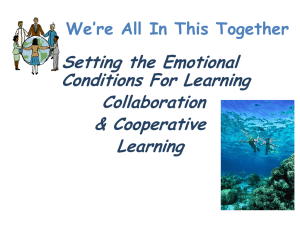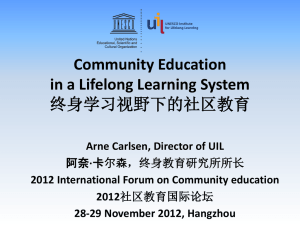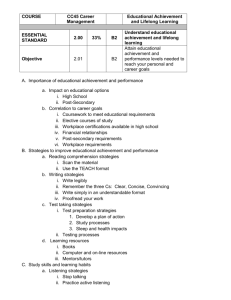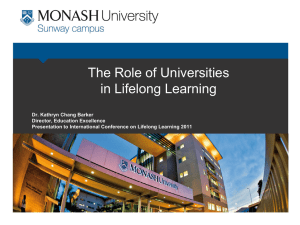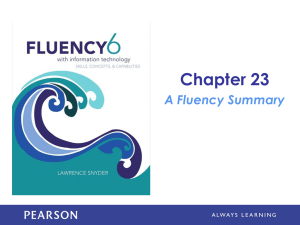Lifelong Learning: Concepts, Theories, Values
advertisement
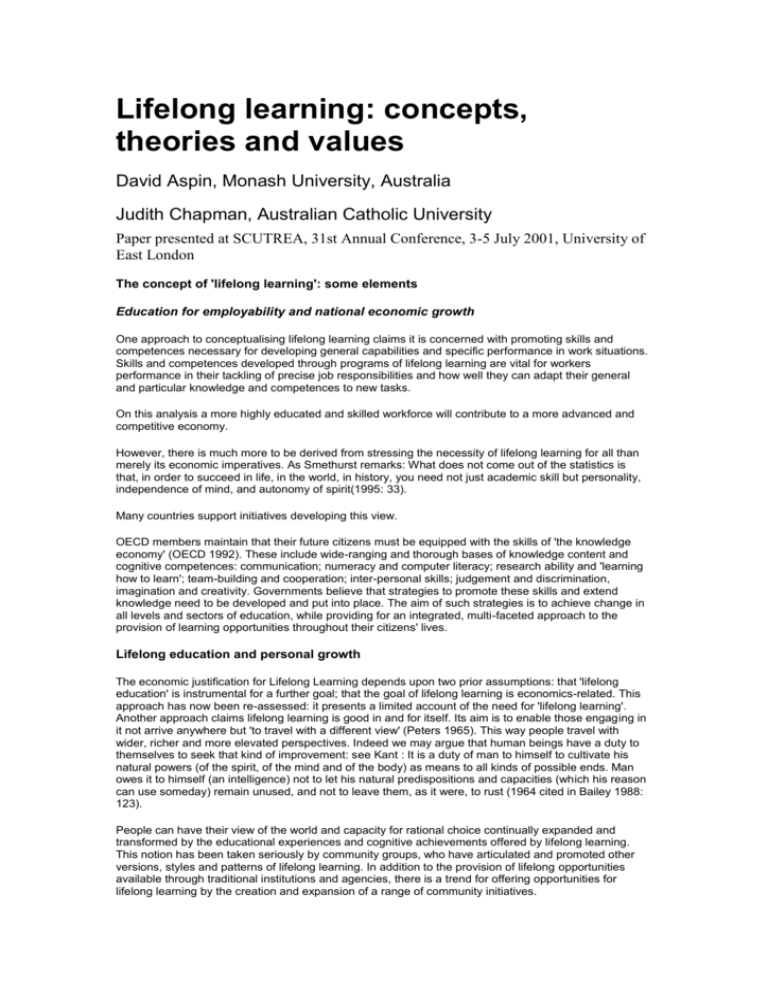
Lifelong learning: concepts, theories and values David Aspin, Monash University, Australia Judith Chapman, Australian Catholic University Paper presented at SCUTREA, 31st Annual Conference, 3-5 July 2001, University of East London The concept of 'lifelong learning': some elements Education for employability and national economic growth One approach to conceptualising lifelong learning claims it is concerned with promoting skills and competences necessary for developing general capabilities and specific performance in work situations. Skills and competences developed through programs of lifelong learning are vital for workers performance in their tackling of precise job responsibilities and how well they can adapt their general and particular knowledge and competences to new tasks. On this analysis a more highly educated and skilled workforce will contribute to a more advanced and competitive economy. However, there is much more to be derived from stressing the necessity of lifelong learning for all than merely its economic imperatives. As Smethurst remarks: What does not come out of the statistics is that, in order to succeed in life, in the world, in history, you need not just academic skill but personality, independence of mind, and autonomy of spirit(1995: 33). Many countries support initiatives developing this view. OECD members maintain that their future citizens must be equipped with the skills of 'the knowledge economy' (OECD 1992). These include wide-ranging and thorough bases of knowledge content and cognitive competences: communication; numeracy and computer literacy; research ability and 'learning how to learn'; team-building and cooperation; inter-personal skills; judgement and discrimination, imagination and creativity. Governments believe that strategies to promote these skills and extend knowledge need to be developed and put into place. The aim of such strategies is to achieve change in all levels and sectors of education, while providing for an integrated, multi-faceted approach to the provision of learning opportunities throughout their citizens' lives. Lifelong education and personal growth The economic justification for Lifelong Learning depends upon two prior assumptions: that 'lifelong education' is instrumental for a further goal; that the goal of lifelong learning is economics-related. This approach has now been re-assessed: it presents a limited account of the need for 'lifelong learning'. Another approach claims lifelong learning is good in and for itself. Its aim is to enable those engaging in it not arrive anywhere but 'to travel with a different view' (Peters 1965). This way people travel with wider, richer and more elevated perspectives. Indeed we may argue that human beings have a duty to themselves to seek that kind of improvement: see Kant : It is a duty of man to himself to cultivate his natural powers (of the spirit, of the mind and of the body) as means to all kinds of possible ends. Man owes it to himself (an intelligence) not to let his natural predispositions and capacities (which his reason can use someday) remain unused, and not to leave them, as it were, to rust (1964 cited in Bailey 1988: 123). People can have their view of the world and capacity for rational choice continually expanded and transformed by the educational experiences and cognitive achievements offered by lifelong learning. This notion has been taken seriously by community groups, who have articulated and promoted other versions, styles and patterns of lifelong learning. In addition to the provision of lifelong opportunities available through traditional institutions and agencies, there is a trend for offering opportunities for lifelong learning by the creation and expansion of a range of community initiatives. This version of the community as an agency and forum for lifelong learning flourishes in the realisation that those engaging in lifelong learning enjoy a range of additional options, from which they may construct a satisfying and enriching pattern of life-enhancing activities (White 1982). Lifelong learning offers people the opportunity to bring up to date their knowledge of activities which they had either previously laid aside or always wanted to try but were unable; to try out activities and pursuits that they had previously imagined were outside their time or competence; or to work at extending their intellectual horizons by seeking to understand and master some of the recent cognitive advances, that have transformed their worlds. However, lifelong learning is not restricted to those beyond the age of education in formal or institutional settings. The expansion of cognitive repertoire and the increasing of skills and competences can continue throughout life, as a vital part of people's growth and development as human beings and as citizens in a participative democracy, as well as being productive agents in economic advancement. Individual and community welfare is protected and promoted by making such activities, and the resources to support them, available to the widest range of constituencies. Smethurst puts this well : Is education a public or a private good? The answer is, neither: it is both. There is some education that is overwhelmingly a public good in that its benefits accrue very widely, to society at large as well as to the individual. Equally there is some education which, while benefiting society, confers overwhelming benefits on the individual learner. But much of education sits annoyingly between these two extremes, leading us, correctly, to want to influence the amount and type of it supplied and demanded, because society has an interest in the outcome, but also to note that it confers benefits on the individual above those societal benefits (Smethurst 1995:44). Lifelong learning is a public good, for the benefit and welfare of everyone in society, not just the preserve of a few. Lifelong learning: a pre-requisite for participation in a socially inclusive and just democracy The availability of educational opportunities over the whole of people's lifespan is a pre-requisite for informed and effective participation in a democratic society (Grace 1994; McLaughlin1994; Smethurst 1995). The same may be said of health, welfare, law and order, and housing, all of which, with education, constitute the infra-structure upon which individuals may construct, realise and work out their own versions of a good life in a society that is mutually supportive, inclusive and just, and so provides the necessary preconditions for active life in a participative democracy. The notion of education as a public good provided the basis in many countries for making 'free and compulsory' education available to all; proponents of education for a socially inclusive and democratic society now also claim lifelong learning as a public good (see Riche sin the Grass, Nordic Council of Ministers, 1995) We do not suggest that education, like other 'public goods' such as health and welfare services, requires no further financial investment from individuals and other sources; all such community services have to be supported financially and in a myriad other ways. But these services are vital and indispensable to the nature, quality and operation of the democratic society in which as citizens we all live and share in. Individuals can only develop as autonomous agents capable of fully participating in society if they are sufficiently informed, prepared and pre-disposed; if they are healthy and well-fed; if they have the minimal domestic conditions for perpetuating existence; and if they can engage in communication with their equals, enjoying the same autonomy as they have themselves, and with whom they can join in discussion, consideration and planning of mutually beneficial modes of action. Society has an interest in securing, providing and safeguarding those conditions and services required by our participation in democratic life. These conditions are provided, at least in part, by the contributions that those who benefit from them make to the common wealth via a publicly funded exchequer. This is what taxes are for - and those with different levels of resources contribute to the exchequer differentially as a result and in proportion. This contribution grants us access to those goods that society makes available for enjoyment by all its members. That contribution brings out the mutual beneficence and inter-dependence of our economic arrangements for funding and running our society and providing appropriate levels and kinds of service for the benefit of all its constituents throughout their lives including those, who because of history, handicap, weakness or sheer misfortune may not able to contribute much to it at the moment but still need its support. This makes society and its various institutions, especially educating institutions, the places, sites and settings in which individuals can develop their pattern of preferred life-options, and so increase their autonomy, and in which all sections of the community co-operate mutually for the benefit of the societal whole. The concept of education as a 'public good' and the responsibility we all share for the mutual benefit of all members of society are fundamental to this version of the need for 'lifelong learning for all'. R H Tawney (Tawney 1938) believed that engagement in adult education was a necessary pre-requisite to and continuing part of participation in the institutions of democracy. Ensuring for all future citizens their liberation from ignorance and potential servitude and exploitation is secured by guaranteeing them access to all forms and fields of human knowledge, understanding and communication in a high quality, wide-ranging and dynamic curriculum in a wide range of institutions devoted to the education of the present and future electorate. Such a curriculum provides people with one of the principal means of personal empowerment, emancipated understanding and informed choice in exercising the duties and responsibilities of a citizen in a participative or representative democracy Three elements in lifelong learning: interaction and fusion None of these aims and undertakings for lifelong learning can be separated from the other: all three elements interact and cross-fertilise each other. There is a complex inter-play between all three, that makes education for a more highly skilled workforce at the same time an education for better democracy and amore rewarding life. The notion and value of 'lifelong learning for all' must be seen as a complex and multi-faceted process. It begins pre-school, is carried on through compulsory and postcompulsory periods of formal education and training, and is continued throughout life, This triadic emphasis requires a more coherent and consistent, better co-ordinated and integrated, more multifaceted approach to learning and to realising a 'lifelong learning' approach for all than hitherto. The central elements in what we have described as the triadic nature of lifelong learning for economic progress and development for personal development and fulfilment for social inclusiveness and democratic understanding and activity are fundamental to building a more democratic polity and set of social institutions. We need in these principles and ideals of social inclusiveness, justice and equity; an economy which is strong, adaptable and competitive; and a range of provision of activities on which people choose for the rewards and satisfactions they confer. To bring this about a substantial re-appraisal of the provision, resourcing and goals of education and training, and a major re-orientation of its direction towards the concept and value of the idea of 'the learning society' is required. This is the major challenge for governments, policy-makers and educators as they seek to conceptualise lifelong learning and articulate policies to realise the aim of 'lifelong learning for all'. A pragmatic approach to conceptualising lifelong learning In our 1997 book The School, the Community and Lifelong Learning we reviewed some versions of the concept of lifelong learning, the conceptions of education articulated in them, showed how they might be deficient or fallacious, and suggested an alternative. Our analysis begins with a scrutiny of notion that an agreed 'essential' definition of the idea of 'lifelong learning' can be arrived at, moves onto the search for such a definition, and then embarks on an examination of two of the most widely-held views of 'lifelong education': one that is termed the 'maximalist' position; and the other that sees lifelong education as an extension of the deliberate and planned interventions characteristic of 'education proper'. Operating from a post-empiricist standpoint, we argue that such searches are misconceived and rest on a false view of the nature of sciences and of concepts, challenging the essentialism of the definitional approach and the claims to objectivity of the 'liberal education extended' account of lifelong education, and rejecting the relativism of the maximalist position. We believe a different expedient should be tried. We believe an objective referent may be found in the problems to the settlement of which lifelong learning programs are addressed. There is more point in looking at the difficulties, issues and predicaments, the attempted solution of which different policies of lifelong learning have been conceived to tackle. We should first attempt to see how, why, and in response to what pressures and problems various policies of lifelong learning have been developed or are at work in education and try to assess whether those policies have succeeded in solving such problems. This will help us accept that, just as there is a myriad of such problems, some of them unique to particular countries, educational systems or institutions, so me much more general and widespread, so there will be a large difference, not only in kind but also in degree of complexity and sophistication, in the type and scale of the solutions proffered to them. There will be small and large-scale differences too in the particular terms of significance in those solutions, the tests for efficacy, the standards of success, and the criteria and arguments that make certain approaches more fruitful than others, for the particular times and circumstances in which they are brought to bear and applied. There is no shortage of problems, issues and questions on which individual countries, institutions and individuals have to address in attempting to work out what will best promote their welfare, how they should act, what choices they need to make, in what directions should they try to shape their futures. Studying how to face the problems of economic growth, social inclusiveness and personal development will empower people to work out ways of improvement their own life and that of their community and hand it on better to their successors. For Warnock (1978) that is the aim of all education. A pragmatic approach to realising lifelong learning for all Pragmatic Criteria for theory, policy and practice The criteria for determining improvement and advance in their respective accounts, policies and undertakings of lifelong learning will require philosophers, researchers, educators and policy-makers to attend to the purposes of the institution in which they are engaged. Chief of these is the solving of problems. The area of common ground in which interests are 'enmeshed' (Aspin & Chapman 1994) provides researchers and policy-makers with a standard against which the progression or degeneration of their research programs or policy initiatives may be measured. In this area the activities of philosophers, educators, researchers and policy-makers coincide. Their common interests provide the area of overlap that Lakatos named the 'touchstone' area (Lakatos1976) against which the theories of one and the policy enterprises of the other may be tested. This we may call the pragmatic approach to policy construction, and management in education. It is to the application, extension, elaboration and refinement of this new way of looking at and trying to deal with the problems of society, community and education that we believe those concerned with lifelong learning should consider turning. A plausible account of the ways in which this approach works lies in the Quinean notion that knowledge in matters of educational policy, curriculum construction and the management and administration of schools and school systems is, like any other cognitive enterprise, a complex web of belief, formed of different elements that interweave and form, in their separate parts, a coherent whole (Quine and Ullian 1976).Conceived of in this way educational discourse and policy analysis and construction is like any science - an unending quest to comprehend clearly the theories with which we are working, to compare them with the theoretical efforts and productions of others faced with similar problems, to subject them to positive criticism, to attempt to improve them and make them fit for their educational purpose: the advancement of efficiency and excellence in all forms of educating institutions, for the benefit of all individuals, for society and for our nations. A helpful analogy is that of Neurath (1932). The theory that we work out in our educational endeavours is like a boat travelling across the sea. Because of the continuing stresses and strains upon it, the craft that is our best theory has continually to be repaired and rebuilt even as it crosses the ocean, while it is still on the move, so to speak - and in a way that will, while still giving overall coherence to the whole, make for a vessel that, at the end of the enterprise of theory building, is much different from the 'theoretic vessel' upon which the journey began. For human beings, the 'end' of the journey comes when we die: it is part of the human cognitive condition that we are always re-building our theories. It is the end of the journey of our lives that marks the end of theory-change. Critical to this enterprise of theory/vessel building and repairing and to the pragmatic criteria with which we work is the need continuously to look at all plans, theories and forms of cognitive transport, drawn up both by ourselves and others, in the attempt to see how well they manage to fulfil their function of conveying their passengers and their intellectual impedimenta an as yet uncharted 'sea '. The criterion of success in any cognitive endeavour will be: has our thinking gained the end towards which it was striving? This involves subjecting our theories, beliefs, policies and solutions to critical scrutiny, appraisal and comparison. This will enable us to assess their effect in meeting the challenges of the problem situations in which we have devised and applied them as we travel to our goals. This then is the nature of our enterprise. Neither logical empiricism, positivism, nor ordinary language analysis will do as single or 'would be' comprehensive theories to account for soundness in our educational policies or effectiveness in our provision of lifelong learning opportunities. We need to adopt a pragmatic' evolutionary epistemology', an approach that goes 'beyond objectivism and relativism' (Bernstein 1983) and facilitates discriminatory theory construction and comparison and so makes our own theories meet for application, modification and repair at every stage of our intellectual journey. We believe that adopting a pragmatic approach will serve us well in our search for solution of one of the most pressing problems in education today: how best can we face the challenges posed by the need for our policies of education and learning to be 'lifelong'?. Let us conceive of our enterprise as an activity of problem-solving and proffering solutions as tentative hypotheses to be, if possible, knocked down (Popper 1972). In this endeavour we need to seek out all possible sources of criticism and potential refutation. If we find one that falsifies our proposed solutions, then, from whatever quarter of the cognitive community it might come, we should be open-minded enough to admit it. We can then treat it on its merits as a source, not only of criticism and further clarification but as an attempt to help provide solutions and best provisional theories for application to the difficulties that beset us and the predicaments that perplex us on the road to finding policies that will best address the problems facing us. That is why we need education and learning to be lifelong. REFERENCES Aspin, D.N. and Chapman, J.D. (1994) Quality Schooling London: Cassell Bailey, C. (1988) 'Lifelong education and liberal education' Journal of Philosophy of Education Vol 22 No 1 pp 121-126 Bernstein, R.J. (1983) Beyond Objectivism and Relativism: Science, Hermeneutics and Praxis Oxford: Basil Blackwell Chapman, J.D. and Aspin, D.N. (1997) The School, the Community and Lifelong Learning London: Cassell Grace, G.R. 'Education is a Public Good: On the Need to Resist the Domination of Educational Science' in Bridges, D. and McLaughlin, T.H. (Eds) (1994) Education and the Market Place London: Falmer Press Kant, I. (1964) The Metaphysical Principles of Virtue (trans James Ellington) Indianapolis: Bobbs-Merrill Library of Liberal Arts pp108-9 Lakatos, I. 'Falsification and the Methodology of Scientific Research Programs' in Lakatos, I. and Musgrave, A.W. Criticism and the Growth of Knowledge Cambridge: Cambridge University Press 1976 McLaughlin, T.H. 'Politics, Markets and Schools: The Central Issues' in Bridges, D. and McLaughlin, T.H. (1994) Neurath, O.(1932). 'Protokollsätze' in Erkenntnis Vol 31932 pp 204-214 OECD (1992) Jobs Study: Facts, Analysis, Strategies Paris: OECD Peters, R.S. (1965) 'Education as Initiation' in Archambault, R.D. (Ed.) Philosophical Analysis and Education London: Routledge & Kegan Paul 1965 Popper, K.R. (1972) Objective Knowledge Oxford: Clarendon Press Quine, W.V. and Ullian, J.S. (1970) The Web of Belief New York: Random House Smethurst, R. (1995)'Education: a public or private good?' RSA Journal Volume CXLIII No.5465 December 1995 pp 33-45 Warnock. M. (1978) Schools of Thought London: Faber & Faber White, J.P. (1982) The Aims of Education Re-Stated London: Routledge & Kegan Paul
